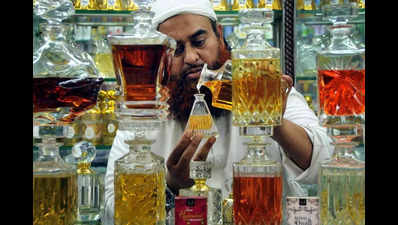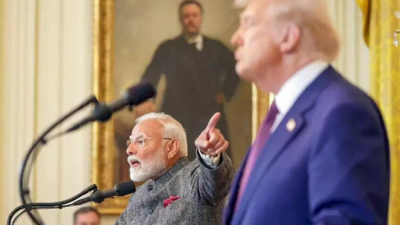Hyderabad: In the narrow lanes of the Old City near Charminar, the air is thick with the dreamy aroma of traditional perfumes. The art of ittar-making, believed to date back to the time of the Prophet Muhammad (PBUH), is experiencing a new lease of life in the digital age through social media.
The roots of India’s ittar (also known as attar) industry run deep, with a centuries-old history centred in Kannauj, Uttar Pradesh. Today, much of the production still flows through Mumbai before reaching international markets in the United Arab Emirates, Saudi Arabia and Kuwait.
“Our family has been perfuming Hyderabad since 1937,” said Syed Abdul Khadar, a third-generation ittar maker at Machili Kamaan, as he carefully transferred a golden-red liquid into a delicate glass bottle. “What we’re seeing now is remarkable — a 30% growth in business in the last five to seven years, largely thanks to social media, which is bringing young people back to traditional fragrances.”
Khadar’s shop, adorned with hundreds of ornate bottles, now offers contemporary blends such as ‘Hyderabad Dreams’ for those who dream of visiting the city, and ‘Hyderabad Memories’ for those who have migrated from the city but miss the smell of home. Such new blends now cater to both tourists and nostalgic expatriates.
Mohammed Salahuddin, another ittar seller near Charminar, emphasised the painstaking process behind these precious fragrances. “Making pure ittar is an art of patience,” he explained, demonstrating how 10 kg oud yields only 250 gm of essence. “Modern synthetic alternatives using solvents such as DPG (dipropylene glycol) and DEG (diethylene glycol) may be cheaper, but they lack the soul and longevity of natural oils.”
The revival of the industry sparked a geographical expansion beyond its traditional hub. New shops have sprung up all over Hyderabad —— from MJ Market to Mallepally, Secunderabad to Borabanda. Small, family-run shops are increasingly opening near masjids to cater to devotees who continue the tradition of applying ittar before prayers.
This revival isn’t just about commerce; it’s also about breathing new life into forgotten cultural traditions. Sandhya Rani, who spent her childhood in Karimnagar in the 1980s, recalled the custom of Dasara ittar. “Muslim ittar sellers would go door-to-door during Dasara and exchange fragrances as a symbol of Hindu-Muslim unity,” she recalls. “The practice would culminate in Alai Balai — three heartfelt hugs exchanged between community members.”
As he carefully arranged his special blends, Khadar held up a vial and said: “Each bottle contains more than just fragrance… It contains our history, our traditions and now our future.”









